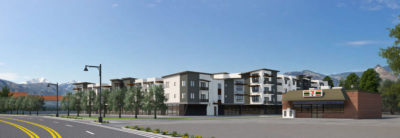Salida developer touts project benefits.

An architectural rendering shows the view of the proposed Salida Crossings condominium development as seen by west-bound traffic on U.S. Highway 50 (courtesy image).
Duane Cozart and his business partners have put time, effort and money into addressing Salida’s lack of affordable housing with the proposed Salida Crossings development, which would include 122 condominium units and 10,600 square feet of retail space.
Salida City Council approved the development by a vote of 4-2 March 20, but former city councilman Hal Brown is spearheading a referendum effort protesting the Highway 50 development, potentially forcing the project’s fate to be decided in a special election.
Brown mentioned questions about impacts from increased density, building height, increased traffic and affordability as reasons for seeking a referendum on the Salida Crossings development.
The former councilman said he and others believe a referendum would provide an opportunity to slow down the process and allow people to get answers to their questions.
Cozart’s response is to note that the city’s affordable housing initiative started “under the stewardship of Jim (LiVecchi) and Hal (Brown). … Now Hal is like, ‘What is affordable housing?’ … It feels like this is a political football game and my project is the football.”
Public records, including video footage on the city’s YouTube page, show that Cozart officially proposed the development in a joint work session of city council and Salida Planning Commission Oct. 16, 2017, during Brown and LiVecchi’s tenure as councilman and mayor.
The project came before another joint session of council and planning commission Dec. 4, 2017. Salida Planning Commission approved the proposed development by a 5-1 vote following a public hearing Jan. 22.
City council reviewed the plan four times – Feb. 6, Feb. 20, March 6 and March 20 – hearing public comments, discussing concerns and requesting changes before granting final approval.
The planned development approved by council includes no short-term rentals and 30 deed-restricted community housing units – 10 more than called for – priced for residents earning no more than 80 percent of area median income.
Cozart and his partners will also pay “in lieu” fees of $244,000 for parks and open space and $43,188 for schools.
“This is the first project in three decades to bring affordable housing to Salida,” Cozart said, noting that prices start at $134,900 for income-qualifying, or deed-restricted, units and $149,900 for units with no restrictions. “We wanted to make everything affordable, not just the income-restricted units.”
Monthly payments for deed-restricted units, including homeowners’ association fees, are projected to cost in the $700 range, depending on interest rates, Cozart said; and the final design approved by council provides 47 percent more parking than the code requires.
“All of the employers I talk to – the hospital, the city, the list goes on and on – employers cannot find people for the jobs they have available,” said Cozart. “They all agreed … (affordable housing) is definitely a problem in Salida.”
Cozart also emphasized his commitment to the community. “I’ve been here as long as Hal Brown has, and the majority of the partners are local. Two of my partners are respected local businessmen – Erik Young and Danny Stotler. Danny is a fourth-generation Salidan, and Erik moved here at the age of 2.”
Should Brown’s referendum petition receive 227 certified signatures, city council would be required to take another vote on Salida Crossings. If council once again approved the planned development, state law requires a special election.
Salida Mayor P.T. Wood said a special election would cost the city between $10,000 and $20,000.







Mr. Brown, withdraw your petition, please.
While you are clearly free to follow due process, think of what you and your group are doing. Current Council, Mayor and staff worked long and hard with the developer to come up with the best package possible. Strong arm tactics like this only show this is a spoiler effort designed to punish the taxpayers and soothe some egos bruised in the election.
How about focusing on getting involved in the process early on, expressing your views like everyone else did, and then just move on? The citizens elected a WORKING Council – let them do their job for as long as they serve.